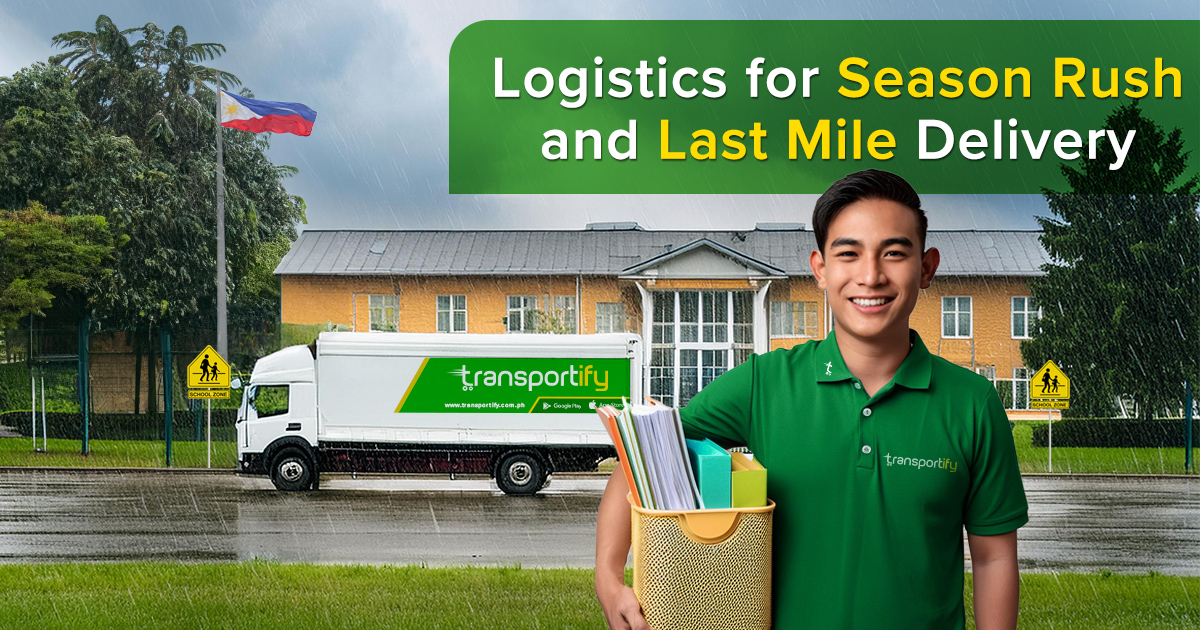
The rainy season presents unique challenges for logistics, from delayed deliveries to damaged goods. Companies often grapple with managing logistics with increased costs, infrastructure issues, and the need for enhanced protective measures to overcome last-mile delivery challenges. Weather-related delays can significantly disrupt operations, with up to 40% of logistics managers citing it as a major concern.
The Impact of Season Rush on Logistics
How Does the Season Rush Affect Delivery Speed and Customer Expectations?
The season rush, particularly nearing major holidays and sales events like sales for school items for the back to school this year, significantly impacts delivery speed and customer expectations. During these periods, the volume of orders surges dramatically, placing immense pressure on logistics companies to maintain timely deliveries especially in this time of the year when back to school season coincides with the rainy season.
Key factors that contribute to the challenges are:
- Increased Volume of Orders
The sheer volume of orders during seasonal rushes can overwhelm logistics networks. With more packages to sort, process, and deliver, the likelihood of delays increases. This can strain existing infrastructure and resources, leading to slower delivery times.
- Traffic Congestion
Urban congestion, already a challenge during normal periods, and is worsened during peak and with rainy weather. Delivery vehicles face longer travel timesor may delay the delivery due to congested roads and very inconvenient times to go outside and deliver.
- Customer Expectations
Customers often have heightened expectations during the season rush. We all want timely delivery of our purchases, but it will be with all due consideration that we do not rush delivery, especially in times of very challenging weather. Life is still more important than any of the learning essentials that you need for school.
Logistics companies employ various strategies to address these challenges, such as increasing driver supply, optimizing delivery routes, and incentivizing drivers to accept deliveries during difficult times. All is possible with clear communication channels to keep customers informed about potential delays and delivery statuses.
What are the Last Mile Delivery Challenges?
Complications and difficulties abound in the last mile delivery segment, which is the last leg of the delivery process from a distribution facility to the customer’s home.
Logistics companies who want to satisfy the increasing needs of the e-commerce market and enhance their operations must recognize these problems.
How Do Customer Expectations and Brand Loyalty Influence Last Mile Delivery?
The demand for fast, reliable, and flexible delivery options that fit busy lifestyles is what last mile delivery is usually for. Meeting these expectations even with logistics companies, especially with the constraints of heavy rains during a season rush will somehow be very challenging. Managing logistics is often the most challenging part of achieving:
- Flexible Delivery Options
- Real-Time Tracking
- Convenient Delivery Options
Managing Logistics with Best Strategies
Managing logistics during the season rush requires a multifaceted approach that combines technology, operational efficiency, and strategic planning. Implementing effective strategies to handle this surge is essential for maintaining service quality and customer satisfaction. Below are key strategies to manage the seasonal rush effectively.
How Can Technology Be Leveraged to Handle Season Rush?
- Advanced Forecasting and Demand Planning
By analyzing historical data, market trends, and other relevant factors, logistics companies can prepare for increased volume and allocate resources accordingly.
- Real-Time Tracking and Visibility
Implementing real-time tracking systems provides visibility into the entire supply chain, enabling better coordination and timely decision-making.
- Dynamic Routing and Optimization
Advanced route optimization software helps in planning the most efficient delivery routes, taking into account real-time traffic conditions, delivery priorities, and available resources. This ensures timely deliveries and reduces fuel costs, even during peak congestion periods.
How Can Operational Efficiency Be Enhanced For Last Mile Delivery Challenges?
- Flexible Workforce Management
Applicable for businesses that are doing last mile deliveries, hiring temporary staff or utilizing a flexible workforce can help manage the busy workload during season rush.
- Inventory Management and Stock Allocation
Even though weather-related challenges are beyond our control, still, the thing that we can control and improve is managing stock levels and ensuring rapid replenishment. It can help mitigate the risk of delays and missed deliveries .
- Enhanced Communication and Collaboration
There’s no better way than enhancing your communication and collaboration when it comes to beating last mile delivery challenges. The customer wants to be informed and still feel connected to the operations of the entire delivery process.
- Contingency Planning and Risk Management
Safety beyond anything else is still the top principle of logistics. Managing logistics with understanding the risk and facing it with a plan are both the responsibility of all the players in the logistics, may it be the logistics provider, the customer, and the business owner.
Transportify Managing the Season Rush and Last Mile Delivery Challenges
What lessons can be learned from logistics in the Philippines?
The archipelagic nature of the country, combined with urban congestion and frequent weather disruptions like the rainy season today, presents a unique set of challenges that Transportify has effectively navigated.
Strategic Planning and Flexibility
One key lesson is the importance of strategic planning and flexibility. During season rush, such as the back to school season, Transportify enhances its capacity planning by forecasting demand spikes for school supplies and allocating additional resources accordingly. This approach ensures that they can handle increased volume without compromising on delivery times.
- Wide Range of Vehicles
Transportify seems to be one of the logistics providers that really offers a wide range of vehicles that would fit different customer needs. No matter the weather rain or shine, your goods will be safe and dry during the entire delivery process since Transportify secured it from sedans to large wing wan trucks, all sealed and practically in good condition to deliver. Check the table below for reference.
Vehicle Type Dimensions/
Weight LimitsBase Price
(Metro Manila)Base Price
(Outside Metro Manila) Base Price
(Visayas/Mindanao) Wing Van
Wing Van 32 to 40 x 7.8 x 7.8 ft
12000kg to 28000kg7000 PHP 6500 PHP 6500 PHP ![]() 6w Fwd Truck
6w Fwd Truck18 x 6 x 7 ft
7000kg4850 PHP 4850 PHP 4850 PHP  Closed Van
Closed Van10 to 14 x 6 x 6 ft
2000kg to 5000kg1600 PHP 1450 PHP 1450 PHP  Open Truck
Open Truck10 to 21 x 6 ft x open
2000kg and 7000kg2300 PHP 1950 PHP 1950 PHP  L300/Van
L300/Van8 x 4.5 x 4.5 ft
1000kg415 PHP 374 PHP 335 PHP  Small Pickup
Small Pickup5 x 5 ft x open
1000kg418 PHP 338 PHP 325 PHP ![]() Light Van
Light Van5.5 x 3.8 x 3.8 ft
600kg375 PHP 292 PHP 275 PHP ![]() MPV/SUV
MPV/SUV5 x 3.2 x 2.8 ft
200kg240 PHP 210 PHP 160 PHP ![]() Sedan
Sedan3.5 x 2 x 2.5 ft
200kg220 PHP 190 PHP 140 PHP
- Technology Integration
Transportify leverages advanced technology to optimize routes and improve delivery efficiency. Real-time traffic data and route optimization algorithms enable their fleet to navigate congested urban areas more effectively.
- Customer Communication
Transportify keeps customers informed about their delivery status through real-time tracking and regular updates. Our 24/7 Customer Live Chat Support provides transparency that not only enhances customer satisfaction but also allows for better management of expectations during season rush.
Preparing for the rainy season by understanding its impact and properly managing logistics, implementing effective strategies, and taking practical measures to protect cargo can help businesses overcome the challenges and ensure a smooth logistics operation.
 | or |




 Instant Quote
Instant Quote

 Chat
Chat